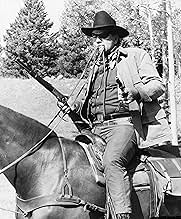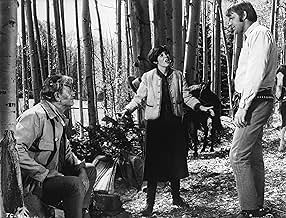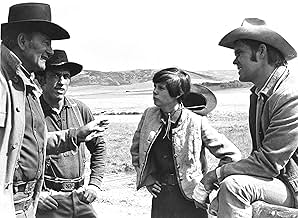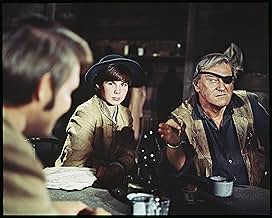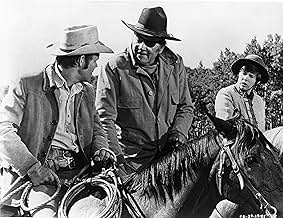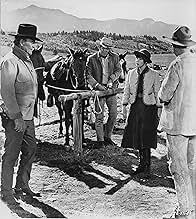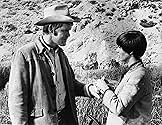A drunken, hard-nosed U.S. Marshal and a Texas Ranger help a stubborn teenager track down her father's murderer in the old American West.A drunken, hard-nosed U.S. Marshal and a Texas Ranger help a stubborn teenager track down her father's murderer in the old American West.A drunken, hard-nosed U.S. Marshal and a Texas Ranger help a stubborn teenager track down her father's murderer in the old American West.
- Won 1 Oscar
- 6 wins & 7 nominations total
- Director
- Writers
- All cast & crew
- Production, box office & more at IMDbPro
Featured reviews
This is perhaps best remembered today as the film for which John Wayne won his only Oscar. Halliwell's Film Guide rather ungraciously refers to it as a "sentimental Oscar, for daring to look old and fat", but there is more to Wayne's performance than that. The Academy, in fact, had tended to overlook Wayne, just as they overlooked the Western genre which provided him with most of his roles; well over a hundred films had only brought him two previous nominations. Cogburn, however, was one of his best roles. On the surface a hard-bitten, irascible old man, he has hidden depths to his character- not only the courage and determination implied by the phrase "true grit", but also a sense of humour and a capacity for tenderness. Cogburn is a lonely man, divorced from his wife and alienated from his only son, and his only friends are a Chinese storekeeper (a rare acknowledgement from Hollywood that not every inhabitant of the West was either white or an Indian) and his cat. A close relationship, however, grows up between him and the orphaned Mattie, for whom he becomes a substitute father. In turn, she becomes the daughter he never had- or perhaps even a substitute son.
Mattie is a complex character. There is much about her that is androgynous- her tomboy looks, her short hair, even her name, which can be short for Matthew as well as Matilda or Martha. She is brave and determined (there is a suggestion that the phrase "true grit" applies to her as well), but can also be a pain in the neck, especially to Cogburn. She is at times wise in the ways of the world and at others strangely innocent. She is part avenging angel, part bookish intellectual (shown by her rather formal language) and part vulnerable child. It is a role that called for an outstanding performance and got one from Kim Darby who was able to bring out all the various facets of Mattie's character. (This is the only film of hers that I have seen, but it seems strange on the strength of this that her subsequent cinema career has been so patchy). Unfortunately, Glenn Campbell, a singer with little previous acting experience, made a weak La Boeuf. It is probably as well that John Wayne did not get his way when he wanted Karen Carpenter, a singer with absolutely no previous acting experience, to play the role of Mattie instead of Darby. Great actors do not always make great casting directors.
"True Grit" does not perhaps have the depth of meaning of some of the truly great Westerns, such as "High Noon", "Unforgiven" or Wayne's last film, "The Shootist", but it is a very good one. It is a fast-moving and exciting adventure, notable for some beautiful photography of mountainous landscapes (although it is ostensibly set in relatively flat Oklahoma, it was actually filmed in Colorado and California), for one of the great iconic moments of the Western (the scene where Cogburn gallops alone into battle, guns blazing, against four opponents) and for two excellent performances in the two main roles. 7/10
A few directors in the past have tried to present the West in a more refined way, giving importance to the settings and the characterization. Among them is Henry Hathaway's True Grit, an emotionally charged Western about a fearless; one-eyed Marshall named Rooster Cogburn.
The film very stylishly brings to fore the Western countryside, from the scenario at a public hanging to the courtroom drama. In the latter we see some tense and heated exchange of words between the prosecuting lawyer and the Marshall.
The intriguing plot unfolds itself very nicely on the silver screen. The story is simple. Tom Cheney, a cowboy, kills his employer. Maddie (Kim Darby), the headstrong daughter of the employer, vows to take revenge and get Cheney hanged for the murder of her father. For the mission she enlists the support of one Rooster Cogburn (John Wayne). Now this Rooster is the meanest Marshall in the entire territory. Having lost one of his eyes in the war, he is totally fearless in disposition, talks brazenly and has an unconventional sense of humor. Despite his hardened exterior, he is warm and benevolent at heart. This is evident in the conversations between him and Maddie.
The third angle to the mission comes in the form of Sgt Lebeof (Glen Campbell), an enthusiastic Texas Ranger, who is after Cheney for his own motive of collecting ransom money. At first instance, Maddie has reservations about Lebeof. He comes across as an ill mannered, uncivilized guy to her. Convinced that Maddie will not make him a party to the pursuit of Cheney, Lebeof, secretively, unknowing from her, teams up with Rooster. He takes Rooster into confidence and through him manages an entry into the chase for Cheney.
The character of Lebeof is an interesting study. He comes across as an inexperienced person who has a knack for saying something silly all the times. He is rebuked many times for such uttering by both Maddie and Rooster.
Rooster had his own reasons for going after Cheney. It so happened that this Cheney was an accomplice of Lucky' Ned Pepper (Robert Duvall) and Rooster had some unfinished business with Ned. He recently had shot Ned in the lower lip during a confrontation but Ned had escaped. Now this chase provided Rooster with another shot at Ned.
The chase is beautifully picturized. Especially the final confrontation between Ned's gang and Rooster. The action sequence in this scene must be seen to be believed.
The reverberating and sweet music score by Elmer Bernstein forms an integral part of the plot. Glen Campbell has rendered the opening title song in his trademark voice. True Grit is a treat to watch for its believable depiction of the life and times of the West. Henry Hathaway, a specialist director of the crime, western and thriller genre has masterfully directed this flick. Re-uniting with Wayne after Sons of Katie Elder (1965), he has managed to extract the very best from his leading man. John Wayne has essayed the role of his lifetime. It is impossible to imagine anybody but him in the lead role as a tough, uncouth and drunken Marshall. Interestingly, Wayne won his only Oscar for this role in 1970.
A tough man on a tough hunt for a gang of toughs - it's John Wayne's film all the way, with this he passed into his last phase in the saddle with a continuous wink at the cowboy parody he had become and which no-one else will ever match. By now after 40 years he was an American legend, your giant avuncular instant-lawman starring in his next horse opera - True Grit would really be nothing special without him, with the fat old man it's a nice Western comedy. We in the audience knew he had Grit before he came on, Kim Darby was just too slow on the uptake. I never understood why the script was so uncharitable to the Texican horse-killing son of a bitch Campbell, he's belittled right up to the scenes in Mattie's family graveyard.
Overall a shot in the arm (or leg!) if seen every few years - even in 1969 entertaining action films could still be made!
Why this film hasn't had more votes and a higher rating in imdb is a complete mystery to me. I'm English, and I always thought the Americans really loved their westerns and John Wayne in particular. Can anyone explain please?
Did you know
- TriviaStunt double Jim Burk performed the entire scene where Rooster Cogburn charged Ned Pepper's gang on horseback. John Wayne was only seen briefly in close-up, and he was riding on a trailer, not a horse.
- GoofsRooster reports Lucky Ned Pepper had robbed the KATY Flyer, a train that did not start running until 1896, long after the time in which the story is set.
- Quotes
[Rooster confronts the four outlaws across the field]
Ned Pepper: What's your intention? Do you think one on four is a dogfall?
Rooster Cogburn: I mean to kill you in one minute, Ned. Or see you hanged in Fort Smith at Judge Parker's convenience. Which'll it be?
Ned Pepper: I call that bold talk for a one-eyed fat man.
Rooster Cogburn: Fill your hand, you son of a bitch!
- Alternate versionsWhen submitted for a rating from the MPAA in 1969, the film was given an "M". The film was edited and rerated "G". The American VHS version contains the "G" rated cut while the DVD is the uncut "M" version (which would be printed as "PG" since the symbol was changed in the 1970s).
- ConnectionsEdited into The Kid Stays in the Picture (2002)
- How long is True Grit?Powered by Alexa
Details
- Release date
- Country of origin
- Official site
- Language
- Also known as
- Cent Dollars pour un shérif
- Filming locations
- Production company
- See more company credits at IMDbPro
Box office
- Gross US & Canada
- $276,418
- Opening weekend US & Canada
- $157,788
- May 5, 2019
- Gross worldwide
- $276,418
Contribute to this page



